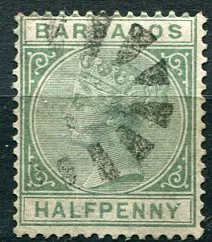- Home
- Philately: postage stamps
- Philately: stamps all over the world
- America
- Barbados
- (1882) MiNr. 32 - O - Barbados - Queen Victoria
(1882) MiNr. 32 - O - Barbados - Queen Victoria
Barbados - postage stamps.

| Code: | BRDK-32r |
| Producer: | Barbados |
| Price: | 0,65 EUR |
| Availability: | Sold out - do not order! |
| Stock: | 0 Pcs |
| Denomination of the stamp: | ½ d - Britská pence |
| Year: | 1882 |
| Condition: | O |
| Catalogue no. (MICHEL): | 32 |
| Cat. number (St. Gibbons): | 90 |
| Cat. number (Yvert et Tellier): | 39 |
Barbados, a small island nation in the Caribbean, had an interesting and turbulent history during the reign of Queen Victoria (1837-1901). At the time, Barbados was a British colony that became a key point in the British Empire, largely due to its strategic location and agricultural production.
During the Victorian era, Barbados was dominated by sugar cane cultivation, which formed the backbone of the local economy. However, the plantations were not without the exploitation of slaves, the main labour force being the mainstay of sugar production. In addition to sugar, rum and cotton were also produced, bringing considerable wealth. Barbados was one of the main exporters of sugar to the UK and other European countries.
In 1834, slavery was abolished in Barbados, part of a wider trend of the British Empire to abolish slavery worldwide. This move, while historically progressive, led to socio-economic changes that had a lasting impact on Barbadian society. Slaves became free people, but most still faced poverty and discrimination.
During the Victorian era, the influence of British culture also began to grow in Barbados. The local aristocracy adopted British ways of life, including English literature, fashion and education. At the same time, however, tensions existed between the British settlers and the local population, particularly over racial segregation and economic inequality.
Barbados became the centre of the British Empire in the Caribbean and became known for its natural beauty, beaches and welcoming climate. But at the time it was also a place of strong social divisions. Queen Victoria reigned during a period when Barbados was undergoing important changes that shaped its modern identity as a separate state, which later became independent in 1966.
This era left a strong mark on Barbados in the form of a cultural heritage that is still evident today. Barbados in the 19th century was therefore a place of contrasts - the wealth from sugar production led to the development of a colonial culture, but also to the injustices that affected its people.
From the Same Category - (1882) MiNr. 32 - O - Barbados - Queen Victoria
Barbados - postage stamps.